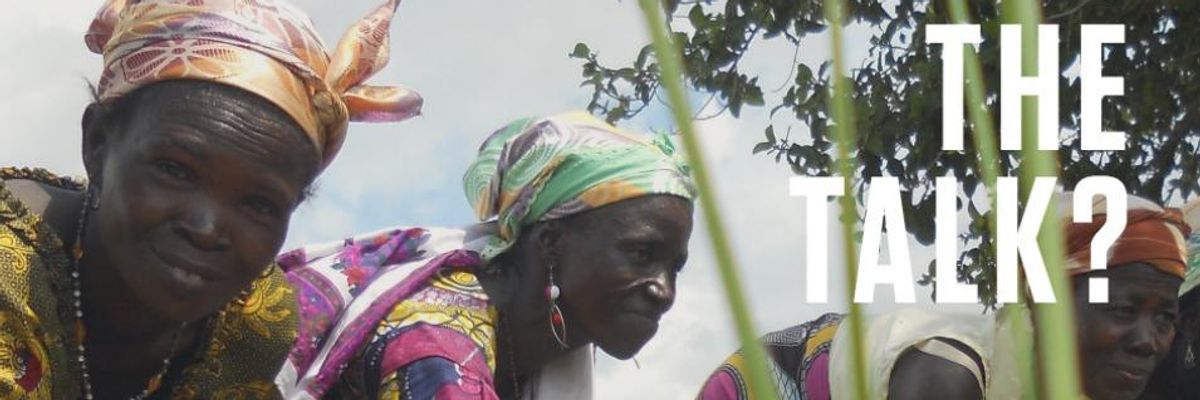

SUBSCRIBE TO OUR FREE NEWSLETTER
Daily news & progressive opinion—funded by the people, not the corporations—delivered straight to your inbox.
5
#000000
#FFFFFF
To donate by check, phone, or other method, see our More Ways to Give page.


Daily news & progressive opinion—funded by the people, not the corporations—delivered straight to your inbox.

The Bank has become increasingly visible at global climate summits and officials regularly comment on the need for reducing greenhouse gas emissions, protecting the climate and making a transition to low-carbon development. However, a sober review of its lending practices reveals the Bank is undermining the cause it purports to champion. (Photo: IPS-DC)
At least in rhetoric, World Bank leadership has acknowledged for a quarter century that "the possible risks [of global warming] are too high to justify complacency or evasion." The Bank itself has cautioned that unabated climate change threatens to reverse hard-earned development gains -- and that the poorest countries and communities will suffer the consequences first and worst.
At least in rhetoric, World Bank leadership has acknowledged for a quarter century that "the possible risks [of global warming] are too high to justify complacency or evasion." The Bank itself has cautioned that unabated climate change threatens to reverse hard-earned development gains -- and that the poorest countries and communities will suffer the consequences first and worst. The Bank has become increasingly visible at global climate summits and officials regularly comment on the need for reducing greenhouse gas emissions, protecting the climate and making a transition to low-carbon development. However, a sober review of its lending practices reveals the Bank is undermining the cause it purports to champion.
We compared World Bank energy sector financing through the International Bank for Reconstruction and Development (IBRD) and International Development Assistance (IDA) for two five-year time periods: 2000 to 2004 and 2010 to 2014.
KEY FINDINGS:
RECOMMENDATIONS
If the World Bank is serious about supporting the transition to low-carbon, sustainable development, it should:
Trump and Musk are on an unconstitutional rampage, aiming for virtually every corner of the federal government. These two right-wing billionaires are targeting nurses, scientists, teachers, daycare providers, judges, veterans, air traffic controllers, and nuclear safety inspectors. No one is safe. The food stamps program, Social Security, Medicare, and Medicaid are next. It’s an unprecedented disaster and a five-alarm fire, but there will be a reckoning. The people did not vote for this. The American people do not want this dystopian hellscape that hides behind claims of “efficiency.” Still, in reality, it is all a giveaway to corporate interests and the libertarian dreams of far-right oligarchs like Musk. Common Dreams is playing a vital role by reporting day and night on this orgy of corruption and greed, as well as what everyday people can do to organize and fight back. As a people-powered nonprofit news outlet, we cover issues the corporate media never will, but we can only continue with our readers’ support. |
At least in rhetoric, World Bank leadership has acknowledged for a quarter century that "the possible risks [of global warming] are too high to justify complacency or evasion." The Bank itself has cautioned that unabated climate change threatens to reverse hard-earned development gains -- and that the poorest countries and communities will suffer the consequences first and worst. The Bank has become increasingly visible at global climate summits and officials regularly comment on the need for reducing greenhouse gas emissions, protecting the climate and making a transition to low-carbon development. However, a sober review of its lending practices reveals the Bank is undermining the cause it purports to champion.
We compared World Bank energy sector financing through the International Bank for Reconstruction and Development (IBRD) and International Development Assistance (IDA) for two five-year time periods: 2000 to 2004 and 2010 to 2014.
KEY FINDINGS:
RECOMMENDATIONS
If the World Bank is serious about supporting the transition to low-carbon, sustainable development, it should:
At least in rhetoric, World Bank leadership has acknowledged for a quarter century that "the possible risks [of global warming] are too high to justify complacency or evasion." The Bank itself has cautioned that unabated climate change threatens to reverse hard-earned development gains -- and that the poorest countries and communities will suffer the consequences first and worst. The Bank has become increasingly visible at global climate summits and officials regularly comment on the need for reducing greenhouse gas emissions, protecting the climate and making a transition to low-carbon development. However, a sober review of its lending practices reveals the Bank is undermining the cause it purports to champion.
We compared World Bank energy sector financing through the International Bank for Reconstruction and Development (IBRD) and International Development Assistance (IDA) for two five-year time periods: 2000 to 2004 and 2010 to 2014.
KEY FINDINGS:
RECOMMENDATIONS
If the World Bank is serious about supporting the transition to low-carbon, sustainable development, it should: